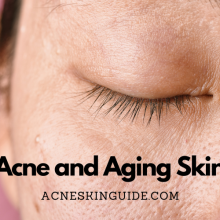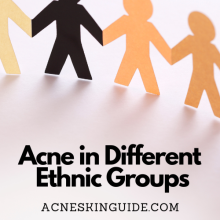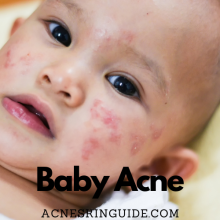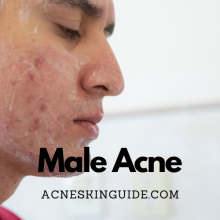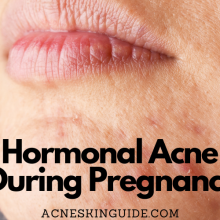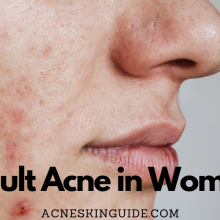Menopause and Acne | Acne Skin Guide
Menopausal acne, though often overlooked, can significantly impact a woman’s self-esteem and well-being. Caused by fluctuating estrogen and progesterone levels, it manifests as deep, cystic lesions unlike teenage acne. Treatment options range from topicals like retinoids and benzoyl peroxide to oral medications and hormone replacement therapy.
Natural remedies like anti-inflammatory diets, supplements, and stress management techniques can also help. Establishing a gentle, non-comedogenic skincare routine is crucial. While treatments have potential downsides, addressing the emotional impact through support systems and counseling is equally important. With a holistic approach combining treatments, lifestyle changes, and emotional support, women can navigate menopausal acne and this transitional phase with confidence and resilience.
#1 Recommended Acne Treatment | #2 Recommended Acne Treatment |
 |  |

Reclaiming Your Radiance: Overcoming the Challenges of Menopausal Acne
For many women, the journey through menopause can be a rollercoaster of physical and emotional changes. While hot flashes, mood swings, and sleep disruptions are well-known menopausal symptoms, one often-overlooked issue is the resurgence of acne. Yes, those pesky pimples that plagued our teenage years can make an unwelcome comeback during midlife, leaving many women feeling self-conscious and frustrated.
Understanding Hormonal Acne During Menopause
As women approach menopause, the fluctuations in estrogen and progesterone levels can wreak havoc on the skin. These hormonal imbalances can lead to an increase in sebum production, clogging pores and creating the perfect environment for acne breakouts. Unlike the acne of our youth, menopausal acne often manifests as deep, painful cystic lesions that can be challenging to treat.
“Hormonal acne during menopause is a real and frustrating issue for many women,” says Dr. Rachel Nazarian, a board-certified dermatologist in New York City. “It’s important to understand that this is not just a cosmetic concern but can also impact self-esteem and overall well-being.”
Treating Menopausal Acne: A Multi-Pronged Approach
Fortunately, there are various treatment options available to help manage menopausal acne. Topical retinoids, such as adapalene or tretinoin, can help unclog pores and regulate cell turnover, while benzoyl peroxide and salicylic acid can reduce inflammation and kill acne-causing bacteria.
For more severe cases, oral medications like spironolactone or low-dose birth control pills may be prescribed to regulate hormone levels. Additionally, hormone replacement therapy (HRT) can help balance estrogen and progesterone levels, potentially improving acne symptoms.
“It’s important to work closely with a dermatologist to find the right combination of treatments,” advises Dr. Nazarian. “A multi-pronged approach that addresses both the hormonal imbalances and the physical manifestations of acne is often most effective.”
Natural Remedies and Lifestyle Changes
For those seeking a more natural approach, certain dietary changes and supplements may help alleviate menopausal acne. Foods rich in antioxidants, like berries and leafy greens, can help reduce inflammation, while omega-3 fatty acids found in fish and nuts can promote healthy skin.
Topical remedies like tea tree oil, green tea, and probiotics have also shown promise in treating acne due to their antimicrobial and anti-inflammatory properties.
Stress management techniques, such as meditation, yoga, and deep breathing exercises, can also play a role in controlling hormonal fluctuations and reducing acne flare-ups.
Skincare Routine and Prevention
Establishing a gentle yet effective skincare routine is crucial for managing menopausal acne. Non-comedogenic (non-pore-clogging) products are essential, and regular gentle exfoliation can help prevent pore blockages.
Downsides and Considerations
While there are various treatment options for menopausal acne, it’s important to be aware of potential downsides and considerations. Certain medications, such as oral antibiotics and some retinoids, may have side effects or contraindications that need to be discussed with a healthcare professional.
Additionally, some natural remedies and supplements may interact with other medications or have their own side effects, so it’s crucial to consult with a healthcare provider before starting any new regimen.
Managing Hormonal Fluctuations and Emotional Well-being
Beyond the physical manifestations of acne, it’s essential to address the emotional and psychological impact of this condition. Dealing with acne as an adult can be incredibly frustrating and can take a toll on self-esteem and body image.
Building a supportive network of friends, family, or joining an online community can provide a safe space to share experiences and receive encouragement. Additionally, seeking professional counseling or therapy can help develop coping strategies and overcome societal stigmas surrounding adult acne.
Long-term Management and Prevention
Even after menopause, maintaining a healthy lifestyle, regular skin check-ups, and addressing recurrent acne flare-ups are essential for long-term management of hormonal acne. Adopting preventive measures, such as maintaining a balanced diet, regular exercise, and stress management, can help minimize future breakouts and promote overall skin health.
Conclusion
Menopausal acne is a common yet often overlooked issue that can significantly impact a woman’s self-confidence and quality of life. By understanding the underlying hormonal causes and exploring various treatment options, women can take control of their skin and navigate this challenging transition with confidence.
Remember, managing menopausal acne requires a holistic approach that addresses not only the physical symptoms but also the emotional and psychological aspects of this condition. With the right combination of treatments, lifestyle changes, and support systems, women can navigate this challenging transition with clarity and resilience.
#1 Recommended Acne Treatment | #2 Recommended Acne Treatment |
 |  |
Summary and FAQs
Can menopause-related acne leave permanent scars or hyperpigmentation?
Yes, menopause-related acne can potentially leave permanent scars or hyperpigmentation on the skin. Here’s a more detailed explanation:
- Scarring: Acne lesions, particularly deep, inflamed cysts or nodules, can damage the skin’s structure and lead to scarring. As women age, the skin’s ability to heal and regenerate diminishes, making it more susceptible to scarring from acne during menopause.
- Hyperpigmentation: Post-inflammatory hyperpigmentation (PIH) is a common issue associated with acne, especially in individuals with darker skin tones. When acne lesions heal, they can leave behind areas of increased pigmentation or discoloration, which can be long-lasting or, in some cases, permanent.
- Factors that increase the risk of scarring and hyperpigmentation:
a. Severity of acne: More severe forms of acne, such as cystic acne or nodular acne, are more likely to cause scarring and hyperpigmentation.
b. Skin picking or squeezing: Manipulating or popping acne lesions can lead to further inflammation and increase the risk of scarring.
c. Delayed treatment: Leaving acne untreated for an extended period can increase the chances of scarring and discoloration.
d. Sun exposure: Excessive sun exposure can worsen hyperpigmentation and make it more difficult to fade over time.
To minimize the risk of permanent scarring or hyperpigmentation, it’s essential to seek prompt and proper treatment for menopausal acne. This may involve a combination of topical and oral medications, as well as professional treatments like chemical peels, laser therapy, or microneedling to address existing scars or discoloration.
Additionally, practicing good skincare habits, such as gentle cleansing, using sun protection, and avoiding picking or squeezing acne lesions, can also help prevent further damage and promote better healing.
How long does menopausal acne typically last?
The duration of menopausal acne can vary from woman to woman, but it is generally considered a temporary condition. Here’s a more detailed overview of how long menopausal acne typically lasts:
- During perimenopause: Acne flare-ups often start during the perimenopausal phase, which can last anywhere from 2 to 10 years before reaching full menopause. During this time, hormonal fluctuations are at their peak, contributing to the development of acne.
- Transition to full menopause: As women transition into full menopause, defined as 12 consecutive months without a menstrual period, hormonal levels begin to stabilize. For many women, this stabilization can lead to a gradual improvement in menopausal acne.
- Post-menopause: Once a woman has reached full menopause, acne often starts to subside within a year or two. However, some women may continue to experience occasional breakouts or residual effects, such as hyperpigmentation or scarring.
- Individual variability: The duration of menopausal acne can vary greatly between individuals. Some women may experience acne throughout the entire menopausal transition, while others may only experience it for a few months or years.
Factors that can influence the duration of menopausal acne include:
- The severity of hormonal imbalances
- Genetics and individual skin sensitivity
- Underlying medical conditions (e.g., polycystic ovary syndrome, thyroid disorders)
- Lifestyle factors (e.g., stress levels, diet, skincare routine)
It’s important to note that if menopausal acne persists for an extended period or worsens over time, it may be advisable to consult a dermatologist or healthcare provider to rule out other potential causes or underlying conditions.
Overall, while menopausal acne can be frustrating, it is typically a temporary condition that resolves within a few years after reaching full menopause for most women.
Can certain foods or dietary habits aggravate menopausal acne?
Yes, certain foods and dietary habits can potentially aggravate menopausal acne. Here are some examples:
- High-glycemic foods: Foods with a high glycemic index, such as refined carbohydrates, sugary drinks, and processed snacks, can spike insulin levels and contribute to hormonal imbalances, which can worsen acne.
- Dairy products: Some studies have suggested a link between dairy consumption, particularly milk and cheese, and an increased risk of acne. This may be due to the hormones naturally present in dairy products or the body’s inflammatory response to certain milk proteins.
- High-fat and greasy foods: Diets high in unhealthy fats, such as fried foods, fast food, and processed snacks, can contribute to increased sebum production and clogged pores, exacerbating acne.
- Alcohol: Excessive alcohol consumption can disrupt hormone levels, dehydrate the skin, and contribute to inflammation, all of which can lead to acne flare-ups.
- Nutritional deficiencies: Deficiencies in certain nutrients, such as zinc, vitamin A, and omega-3 fatty acids, may impair skin health and worsen acne.
On the other hand, certain dietary habits can help manage menopausal acne:
- Eating a diet rich in antioxidants: Consuming foods like berries, leafy greens, and vegetables can help reduce inflammation and support skin health.
- Increasing fiber intake: Fiber-rich foods, such as whole grains, fruits, and vegetables, can help regulate hormone levels and improve gut health, which may benefit acne.
- Staying hydrated: Drinking plenty of water can help flush out toxins and keep the skin properly hydrated.
- Limiting processed and inflammatory foods: Minimizing consumption of processed, sugary, and high-fat foods can help reduce inflammation and prevent acne flare-ups.
It’s important to note that every individual may react differently to certain foods, so it may be helpful to keep a food diary and identify potential triggers. Additionally, consulting a dermatologist or a registered dietitian can provide personalized dietary recommendations for managing menopausal acne.
Are there any specific makeup or skincare ingredients that should be avoided during menopausal acne?
Yes, there are certain makeup and skincare ingredients that should be avoided or used with caution during menopausal acne. Here are some examples:
- Comedogenic ingredients: These are ingredients that can clog pores and potentially lead to acne breakouts. Some comedogenic ingredients to avoid include:
- Isopropyl myristate
- Lanolin
- Coconut oil
- Cocoa butter
- Mineral oil
- Fragrance and dyes: Fragrances and synthetic dyes can be irritating to the skin, especially when dealing with acne. These ingredients can cause further inflammation and should be avoided.
- Alcohol-based products: Products containing high concentrations of alcohol can be drying and strip the skin of its natural oils, leading to irritation and potential acne flare-ups.
- Heavy, occlusive products: Thick, greasy creams and lotions can clog pores and exacerbate acne. Opt for light, non-comedogenic moisturizers instead.
- Harsh scrubs or exfoliants: While gentle exfoliation can be beneficial, harsh scrubs or physical exfoliants can cause micro-tears in the skin and aggravate existing acne lesions.
Instead, look for makeup and skincare products labeled as “non-comedogenic,” “oil-free,” or “non-acnegenic.” Additionally, consider using products containing ingredients known to be beneficial for acne-prone skin, such as:
- Salicylic acid: A beta-hydroxy acid that helps unclog pores and reduce inflammation.
- Benzoyl peroxide: An antibacterial agent that can help kill acne-causing bacteria.
- Retinoids: Vitamin A derivatives that can regulate cell turnover and prevent clogged pores.
- Niacinamide: A form of vitamin B3 that can help reduce inflammation and improve skin barrier function.
It’s always a good idea to patch test new products before using them, and consult with a dermatologist or skincare professional for personalized recommendations, especially if you have severe or persistent menopausal acne.
How does stress impact menopausal acne, and what are effective stress management techniques?
Stress can have a significant impact on menopausal acne, and managing stress levels is an important aspect of controlling hormonal breakouts during this life stage. Here’s how stress affects menopausal acne and some effective stress management techniques:
How Stress Impacts Menopausal Acne:
- Hormonal imbalances: Stress triggers the release of hormones like cortisol and androgens, which can disrupt the balance of other hormones and lead to increased sebum production and acne.
- Inflammation: Chronic stress can cause systemic inflammation in the body, including skin inflammation, which can worsen acne symptoms.
- Weakened immune system: Prolonged stress can weaken the immune system, making the skin more susceptible to bacterial infections and acne flare-ups.
- Disrupted sleep: Stress often leads to poor sleep quality, and lack of sleep can affect hormone regulation and exacerbate acne.
Effective Stress Management Techniques:
- Mindfulness and meditation: Practices like deep breathing, mindfulness meditation, and yoga can help reduce stress levels and promote relaxation.
- Exercise: Regular physical activity can help release endorphins (natural mood boosters) and reduce stress hormones.
- Counseling or therapy: Working with a professional therapist or counselor can provide coping strategies and techniques for managing stress and anxiety.
- Support system: Building a strong support network of friends, family, or support groups can provide emotional support and a safe space to share experiences.
- Relaxation techniques: Activities like taking a warm bath, listening to calming music, or practicing progressive muscle relaxation can help reduce stress and tension.
- Time management: Learning to prioritize tasks, set boundaries, and manage time effectively can help reduce stress related to overwhelming schedules or responsibilities.
- Diet and lifestyle changes: Eating a balanced diet, getting enough sleep, and engaging in enjoyable hobbies or activities can promote overall well-being and resilience to stress.
It’s important to note that stress management is not a one-size-fits-all approach, and different techniques may work better for different individuals. Incorporating a combination of stress-reduction strategies and addressing underlying stress triggers may be most effective in managing menopausal acne and promoting overall health during this transitional period.

